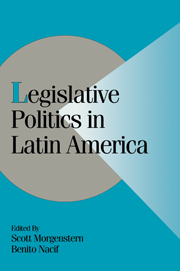Book contents
- Frontmatter
- Contents
- Tables and Figures
- Contributors
- Preface and Acknowledgments
- Party Names and Other Acronyms and Abbreviations
- 1 TOWARDS A MODEL OF LATIN AMERICAN LEGISLATURES
- Part I Executive–Legislative Relations
- 2 OSCILLATING RELATIONS: PRESIDENT AND CONGRESS IN ARGENTINA
- 3 PRESIDENTIAL CABINETS, ELECTORAL CYCLES, AND COALITION DISCIPLINE IN BRAZIL
- 4 EXAGGERATED PRESIDENTIALISM AND MODERATE PRESIDENTS: EXECUTIVE–LEGISLATIVE RELATIONS IN CHILE
- 5 EXECUTIVE–LEGISLATIVE RELATIONS: THE CASE OF MEXICO (1946–1997)
- Part II Political Parties and Legislative Structure
- Part III Legislatures and the Policy Process
- Part IV Conclusions
- References
- Author Index
- General Index
2 - OSCILLATING RELATIONS: PRESIDENT AND CONGRESS IN ARGENTINA
Published online by Cambridge University Press: 14 January 2010
- Frontmatter
- Contents
- Tables and Figures
- Contributors
- Preface and Acknowledgments
- Party Names and Other Acronyms and Abbreviations
- 1 TOWARDS A MODEL OF LATIN AMERICAN LEGISLATURES
- Part I Executive–Legislative Relations
- 2 OSCILLATING RELATIONS: PRESIDENT AND CONGRESS IN ARGENTINA
- 3 PRESIDENTIAL CABINETS, ELECTORAL CYCLES, AND COALITION DISCIPLINE IN BRAZIL
- 4 EXAGGERATED PRESIDENTIALISM AND MODERATE PRESIDENTS: EXECUTIVE–LEGISLATIVE RELATIONS IN CHILE
- 5 EXECUTIVE–LEGISLATIVE RELATIONS: THE CASE OF MEXICO (1946–1997)
- Part II Political Parties and Legislative Structure
- Part III Legislatures and the Policy Process
- Part IV Conclusions
- References
- Author Index
- General Index
Summary
This chapter analyzes executive–legislative relations in Argentina from the inauguration of democracy in 1983 through 1995, when Carlos S. Menem finished his first term in office. We will enter into this theme by investigating the principal risk to executive-legislative relations in presidential regimes: institutional paralysis.
Juan Linz and other critics of presidentialism have called attention to the risks of institutional paralysis, which they argue originate from the principle of division of powers and fixed electoral calendars. These factors, therefore, are inherent in the institutional structure of presidentialism. In effect, the principle of division of powers, which originates from the independent election of the executive and the legislative branches, generates autonomous powers armed with mutual vetoes. On top of this, the rigidity that stems from fixed electoral periods prevents a change of leadership, even during crisis situations, as well as the forced retirement of popular leaders. This argument leads to important questions about the two postdictatorship Argentine presidencies, both of which contained the seeds propitious for generating institutional paralysis. On the one hand, President Alfonsín faced a divided government and President Menem lacked an absolute majority in the Chamber of Deputies. On the other hand, the country faced crisis situations including military rebellions and hyperinflation. Nevertheless, Argentina has not experienced harmful episodes of gridlock.
These facts suggest that the critique of Linz and his followers requires a more careful specification of the conditions necessary to engender gridlock. First, independent election of the two branches should not generate gridlock where presidents can count on a reliable majority in the Congress.
- Type
- Chapter
- Information
- Legislative Politics in Latin America , pp. 23 - 47Publisher: Cambridge University PressPrint publication year: 2002
- 21
- Cited by



